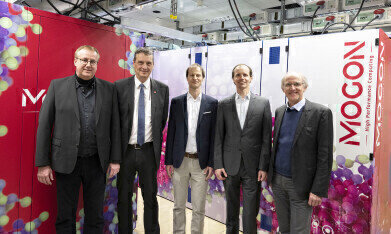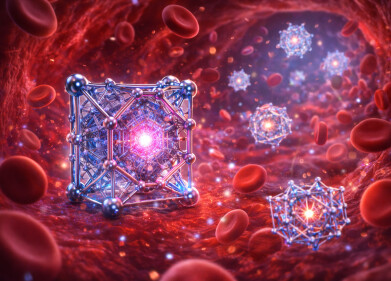-
 Pictured from left: Professor Dr. Nicolas Gauger, Director of the Computing Center (RHRZ) at the University of Kaiserslautern-Landau, Professor Dr. Stefan Müller-Stach, Vice President for Research and Early Career Academics at Johannes Gutenberg University Mainz, Dr. Simon Moll, Head of High Performance Computing at Saarland University, Professor Dr. Thorsten Kollegger of Goethe University Frankfurt, and Professor Dr. Arnd Poetzsch-Heffter, President of the University of Kaiserslautern-Landau (photo: Peter Pulkowski)
Pictured from left: Professor Dr. Nicolas Gauger, Director of the Computing Center (RHRZ) at the University of Kaiserslautern-Landau, Professor Dr. Stefan Müller-Stach, Vice President for Research and Early Career Academics at Johannes Gutenberg University Mainz, Dr. Simon Moll, Head of High Performance Computing at Saarland University, Professor Dr. Thorsten Kollegger of Goethe University Frankfurt, and Professor Dr. Arnd Poetzsch-Heffter, President of the University of Kaiserslautern-Landau (photo: Peter Pulkowski)
News
HPC Inauguration marks Milestone of National Collaboration
Mar 21 2023
Since its acceptance into Germany’s National High Performance Computing Alliance (NHR) in 2021, the NHR South-West consortium - consisting of Johannes Gutenberg University Mainz (JGU), the University of Kaiserslautern-Landau (RPTU), Goethe University Frankfurt, and Saarland University – has taken an important step towards establishing a powerful, modern research infrastructure with the inauguration of the new high-performance computer (HPC) MOGON NHR South-West at JGU.
NHR South-West will be funded to the tune of EUR 7.5 million through the National High Performance Computing program of the German federal and state governments, with the state of Rhineland-Palatinate contributing EUR 3.75 million of this alone.
"NHR South-West has been able to make significant progress in further expanding its technical computing power. The new computer helps NHR South-West ensure that not only researchers at the four participating universities, but from all over Germany have sufficient computing capacity for their work. The use of high-performance computers has long since become indispensable in many fields of research due to the large volumes of data and the complexity of simulation calculations," said Clemens Hoch, Rhineland-Palatinate's Minister of Science.
"Fundamental research in the natural and life sciences requires sufficiently dimensioned computing resources," emphasised Professor Stefan Müller-Stach, Vice President for Research and Early Career Academics at Mainz University. "Working groups in many scientific disciplines depend on powerful high-performance computers to maintain and further extend their predominant position in various fields of research. Thus, we are very pleased to have this cutting-edge IT infrastructure at hand – in face of the increasing competition among universities both nationally and internationally in general and especially in the field of data processing."
The new MOGON NHR South-West computer will enable research groups to apply for computing time to advance research or in the fields of high-energy physics, condensed matter physics and the life sciences.
At the inauguration ceremony at JGU Professor Friederike Schmid explained the need for HPC, taking as an example the Multiscale Simulation Methods for Soft Matter Systems research project. As a member of the corresponding Collaborative Research Center funded by the German Research Foundation, she is investigating soft matter in various size and time scales.
"The long-term goal of our research is to upgrade multiscale techniques so they can be used in routine simulations of real-world soft material applications. Multiscale techniques are used to solve problems where important processes occur in different magnitudes in space and / or time. We aim to be able to make predictions and suggestions as to how material properties can be tangibly improved and we can only do that with powerful computers running in the background," she added.
More information online
Digital Edition
Lab Asia Dec 2025
December 2025
Chromatography Articles- Cutting-edge sample preparation tools help laboratories to stay ahead of the curveMass Spectrometry & Spectroscopy Articles- Unlocking the complexity of metabolomics: Pushi...
View all digital editions
Events
Jan 21 2026 Tokyo, Japan
Jan 28 2026 Tokyo, Japan
Jan 29 2026 New Delhi, India
Feb 07 2026 Boston, MA, USA
Asia Pharma Expo/Asia Lab Expo
Feb 12 2026 Dhaka, Bangladesh


















